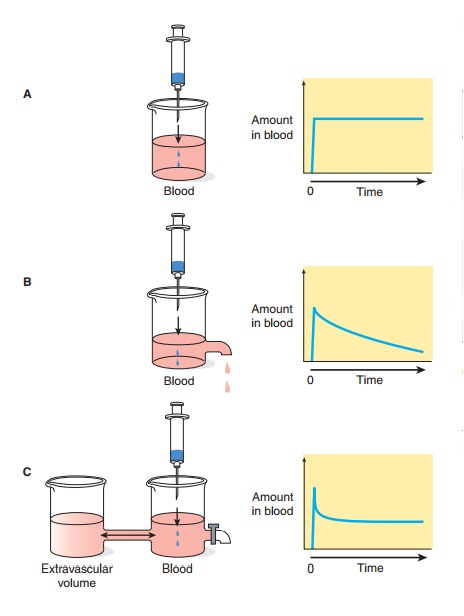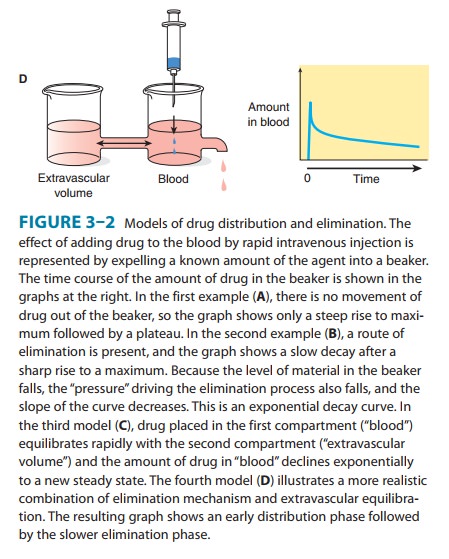Pharmacokinetics Part 4 Drug Distribution And Volume Of Distribution

Pharmacokinetics Part 1 Pdf Bioavailability Pharmacokinetics Pharmacokinetics is the study of how an organism affects the drug, whereas pharmacodynamics (pd) is the study of how the drug affects the organism. both together influence dosing, benefit, and adverse effects, as seen in pk pd models. Pharmacokinetics (pk) is the study of how the body interacts with administered substances for the entire duration of exposure (medications for the sake of this article).

Lecture No 4 Pharmacokinetics Mechanism Of Drug Transport Processes Pdf Cell Membrane Pharmacokinetics, sometimes described as what the body does to a drug, refers to the movement of drug into, through, and out of the body—the time course of its absorption, bioavailability, distribution, metabolism, and excretion. Pharmacokinetics is essential for guaranteeing the safety of clinical medications used to treat a wide range of ailments and diseases. it investigates what happens to a drug once it enters the body, specifically how it is absorbed, distributed, metabolized, and removed. Pharmacokinetics is currently defined as the study of the time course of drug absorption, distribution, metabo lism, and excretion. clinical pharmacokinetics is the application of pharmacokinetic principles to the safe and effective therapeutic management of drugs in an individual patient. Pharmacokinetics is the branch of pharmacology devoted to understanding what the body does to a drug once it has been administered. this entails a detailed look at four main processes collectively known by the acronym adme: absorption, distribution, metabolism, and excretion.

Pharmacokinetic Principles Absorption Distribution Metabolism And Excretion Of Drugs Pdf Pharmacokinetics is currently defined as the study of the time course of drug absorption, distribution, metabo lism, and excretion. clinical pharmacokinetics is the application of pharmacokinetic principles to the safe and effective therapeutic management of drugs in an individual patient. Pharmacokinetics is the branch of pharmacology devoted to understanding what the body does to a drug once it has been administered. this entails a detailed look at four main processes collectively known by the acronym adme: absorption, distribution, metabolism, and excretion. Pharmacokinetics: study of the the movement of drugs within the body (encompasses absorption, distribution & elimination) i. what the body does to the drug. Pharmacokinetics is the study of how the body processes a drug. pharmacokinetics is often organized into the four discrete processes of absorption, distribution, metabolism, and excretion (adme). Pharmacokinetics is defined as the quantitative analysis of the processes of drug absorption, distribution, and elimination that determine the time course of drug action. Basic pharmacokinetics (pk) knowledge and skills are essential in practicing therapeutics. compared with physicians, pharmacists receive intense pk training through their professional education; therefore, they are far advanced in their capability of interpreting and assessing the pharmaceutical part of therapeutic management of patients.

M1 Lesson 4 Pharmacokinetics Models Two Compartment Iv Pdf Pharmacokinetics Pharmacokinetics: study of the the movement of drugs within the body (encompasses absorption, distribution & elimination) i. what the body does to the drug. Pharmacokinetics is the study of how the body processes a drug. pharmacokinetics is often organized into the four discrete processes of absorption, distribution, metabolism, and excretion (adme). Pharmacokinetics is defined as the quantitative analysis of the processes of drug absorption, distribution, and elimination that determine the time course of drug action. Basic pharmacokinetics (pk) knowledge and skills are essential in practicing therapeutics. compared with physicians, pharmacists receive intense pk training through their professional education; therefore, they are far advanced in their capability of interpreting and assessing the pharmaceutical part of therapeutic management of patients.

Volume Of Distribution Pharmacokinetics Pharmacokinetics is defined as the quantitative analysis of the processes of drug absorption, distribution, and elimination that determine the time course of drug action. Basic pharmacokinetics (pk) knowledge and skills are essential in practicing therapeutics. compared with physicians, pharmacists receive intense pk training through their professional education; therefore, they are far advanced in their capability of interpreting and assessing the pharmaceutical part of therapeutic management of patients.

Volume Of Distribution Pharmacokinetics
Comments are closed.